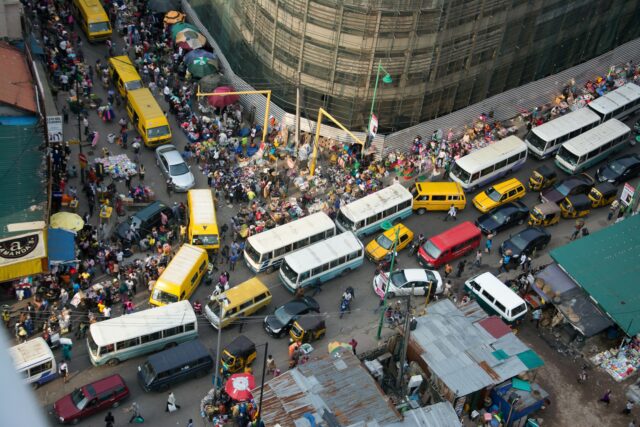
Lagos, Nigeria’s economic powerhouse and former capital, stands as one of the world’s fastest-growing megacities and a compelling case study in urban overpopulation. With an estimated population exceeding 15 million people in its metropolitan area, Lagos represents both the promise and peril of rapid urbanization in developing nations. This sprawling metropolis, built on a collection of islands and coastal lowlands, faces unprecedented challenges as it struggles to accommodate millions of residents while maintaining basic infrastructure and services.
The Scale of Growth
The sheer pace of Lagos’s population growth defies conventional urban planning models. From a modest fishing village of approximately 300,000 people in 1950, Lagos has exploded into one of Africa’s largest urban centers. Current projections suggest that by 2050, the city could house over 30 million residents, potentially making it the world’s largest urban agglomeration. This exponential growth stems from multiple factors: high birth rates, internal migration from rural areas seeking economic opportunities, and the city’s role as West Africa’s commercial hub.
The magnetic pull of Lagos is undeniable. As Nigeria’s economic nerve center, the city contributes approximately 30% of the country’s GDP despite occupying less than 0.4% of its land mass. This economic concentration creates a powerful draw for job seekers, entrepreneurs, and families hoping to escape rural poverty. However, the city’s infrastructure was never designed to handle such massive population influxes, creating a perfect storm of urban challenges.
Infrastructure Under Pressure
Lagos’s infrastructure groans under the weight of its swelling population. The transportation system, perhaps the most visible manifestation of overpopulation, showcases the city’s struggles. Traffic congestion in Lagos is legendary, with commuters often spending three to four hours daily traveling relatively short distances. The existing road network, much of it dating back to the colonial era, simply cannot accommodate the estimated 12 million daily trips made across the metropolis.
Public transportation, while extensive, operates at capacity and beyond. The iconic yellow buses (danfo) and motorcycle taxis (okada) form an informal but vital network that moves millions of people daily. However, these systems operate chaotically, contributing to air pollution and safety concerns. Recent efforts to modernize transportation, including the Lagos Bus Rapid Transit (BRT) system and ongoing rail projects, represent steps toward addressing these challenges, but the scale of need far outpaces current solutions.
Water and electricity supply present equally daunting challenges. Despite being surrounded by water, many Lagos residents lack access to clean, reliable water supplies. The state water corporation can only serve a fraction of the population, forcing millions to rely on private boreholes, vendors, or sachet water. Similarly, electricity supply remains erratic, with frequent power outages forcing businesses and residents to depend on expensive diesel generators, contributing to air pollution and economic inefficiency.
Housing Crisis and Informal Settlements
Perhaps nowhere is Lagos’s overpopulation more apparent than in its housing sector. The city faces a housing deficit estimated at over 2 million units, pushing property prices to astronomical levels that price out the majority of residents. This shortage has spawned extensive informal settlements, commonly known as slums, where millions live in substandard conditions.
Makoko, often called the “Venice of Africa,” exemplifies these challenges. Built entirely on stilts over Lagos Lagoon, this floating slum houses an estimated 300,000 people in wooden shacks connected by narrow boardwalks. While Makoko demonstrates remarkable human ingenuity and community resilience, it also highlights the desperate housing situation facing Lagos’s urban poor. Residents lack basic amenities like clean water, proper sanitation, and electricity, while living under constant threat of eviction and flooding.
The government’s response to informal settlements has been mixed, ranging from forced evictions to upgrade programs. However, the scale of the housing crisis far exceeds current intervention capacity, and new informal settlements continue to emerge faster than existing ones can be addressed.
Economic Opportunities and Challenges
Despite its challenges, Lagos’s population density creates unique economic opportunities. The city’s informal economy is remarkably vibrant, employing millions in everything from street trading to artisanal manufacturing. Markets like Alaba International Market and Computer Village have become regional trading hubs, demonstrating how population concentration can drive commercial activity.
The tech sector has also flourished in Lagos, earning the city recognition as a major African tech hub. The concentration of talent, capital, and infrastructure in Lagos has attracted both local startups and international companies, creating a growing knowledge economy. However, these opportunities remain largely concentrated among the educated middle class, while millions of residents struggle in low-productivity informal employment.
Environmental Impact
Overpopulation has severe environmental consequences for Lagos. The city generates thousands of tons of waste daily, much of which ends up in waterways or informal dumps due to inadequate waste management systems. Olusosun Landfill, once one of Africa’s largest dumps, exemplifies the scale of waste challenges facing the city.
Air pollution represents another critical concern. Vehicle emissions, industrial activity, and the widespread use of generators create a toxic atmospheric cocktail that poses serious health risks. Water pollution is equally problematic, with industrial waste, sewage, and solid waste contaminating the lagoons and coastal waters that define Lagos’s geography.
Climate change compounds these environmental challenges. Rising sea levels threaten the low-lying areas of Lagos, while increasingly intense rainfall overwhelms the city’s inadequate drainage systems, leading to regular flooding that displaces thousands and damages property.
Government Response and Urban Planning
The Lagos State Government has implemented various initiatives to address overpopulation challenges. The Lagos State Development Plan outlines ambitious goals for infrastructure development, including new cities like Eko Atlantic and Lekki. These projects aim to create modern, planned urban environments that can accommodate future growth while providing better living standards.
However, critics argue that these developments primarily serve affluent residents while doing little for the urban poor who comprise the majority of Lagos’s population. The challenge lies in creating inclusive development that addresses the needs of all residents, not just those who can afford premium housing and services.
Looking Forward
Lagos’s overpopulation challenge requires comprehensive, multi-faceted solutions. Success will depend on coordinated efforts to improve infrastructure, create affordable housing, strengthen governance, and develop sustainable economic opportunities. Regional planning that distributes development more evenly across Nigeria could help reduce migration pressure on Lagos, while improved urban management could better serve existing residents.
The stakes are enormous. How Lagos navigates its overpopulation challenge will influence the trajectory of urbanization across Africa and provide lessons for other rapidly growing cities worldwide. Success could establish Lagos as a model for sustainable megacity development, while failure could perpetuate cycles of poverty, environmental degradation, and social instability.
As Lagos continues to grow, the city stands at a crossroads. The choices made today regarding urban planning, infrastructure investment, and governance will determine whether this remarkable metropolis can harness the potential of its massive population or remain overwhelmed by the challenges of uncontrolled growth. The world watches as Lagos writes the next chapter in the story of 21st-century urbanization.










